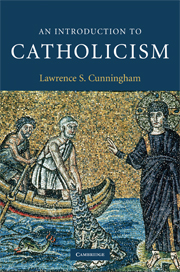Book contents
- Frontmatter
- Contents
- Illustrations
- Preface
- Acknowledgments
- 1 The many meanings of Catholicism
- 2 Roman Catholicism
- 3 Being Catholic: Some typologies
- 4 Catholicism in place and time
- 5 Catholic worship
- 6 The rule of faith
- 7 Catholic spirituality
- 8 The missionary character of Catholicism
- 9 Catholic reformation(s)
- 10 The moral life
- 11 The contemporary Catholic Church
- 12 Reading Catholicism: Bibliographical resources
- Index
- References
8 - The missionary character of Catholicism
Published online by Cambridge University Press: 05 June 2012
- Frontmatter
- Contents
- Illustrations
- Preface
- Acknowledgments
- 1 The many meanings of Catholicism
- 2 Roman Catholicism
- 3 Being Catholic: Some typologies
- 4 Catholicism in place and time
- 5 Catholic worship
- 6 The rule of faith
- 7 Catholic spirituality
- 8 The missionary character of Catholicism
- 9 Catholic reformation(s)
- 10 The moral life
- 11 The contemporary Catholic Church
- 12 Reading Catholicism: Bibliographical resources
- Index
- References
Summary
INTRODUCTION
As we noted in the opening chapter of this book, Catholicism has always understood its universality as a call to reach all people. As a consequence, the Catholic Church has always manifested a strong missionary character as one of its defining characteristics. That missionary impulse means that it is a mandate to reach the Gospel everywhere and at all times. The universal character of Catholicism is both a fact and an urgent necessity.
That Christianity spread from its Jerusalem center rapidly after the earthly life of Jesus is a fact. Indeed, it is clear from the New Testament itself that the first Christians had a conviction that they were inspired by God to spread their faith universally. Catholics have always invoked the “great mandate” found in the Gospel of Matthew as their missionary watchword: “Go therefore and make disciples of all nations, baptizing them in the name of the Father and of the son and of the Holy Spirit” (Matt. 28:19). According to the Acts of the Apostles, the disciples, shortly before the ascension of Jesus into the heavens, heard him stipulate something quite similar: “But you will receive power when the Holy Spirit comes upon you; and you will be my witnesses in Jerusalem, in all Judea and Samaria, and to the ends of the earth” (Acts 1:8).
- Type
- Chapter
- Information
- An Introduction to Catholicism , pp. 172 - 194Publisher: Cambridge University PressPrint publication year: 2009

